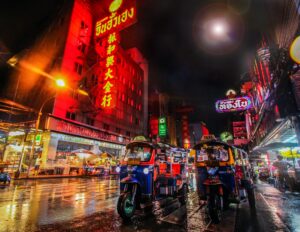
By Mackenzie Newlyn, Contributor and Undergraduate at the University of York
As Thailand goes into their 3rd wave of the COVID-19 pandemic, it is clear to see that circumstances are the worst they have been so far, with cases rising at an immense rate. Due to poor management, hundreds of Thai citizens have been left waiting overnight in the streets of Bangkok just to receive a test, further worsening the situation.
In order to understand the politics behind Thailand’s current situation, however, it’s important to understand the political instability behind it. Thailand identifies itself as having a unitary parliamentary constitutional monarchy, King Rama X having little power under the constitution (yet still claiming the title of world’s wealthiest monarch) giving the majority of power to the government in office, led by PM Prayuth Chano-cha. Prior to his prime ministerial position, Prayuth served as chief of the Thai army which enacted a military coup (Thailand’s 13th since the start of the 20th century) in 2014 and seized control of the country. Through this, he installed the military juta of the NCPO (National Council for Peace and Order), which governed until his democratic election into a 19-party coalition in 2019. Although an exceptionally brief description of Thailand’s political history, this outlines the possible mistrust the country feels towards its head of state and the difficult politics behind everyday life.
Thailand has seen a massive rise in COVID-19 cases, ranging from 29,571 cases on 6th April 2021 to a whopping 294,653 on 6th July 2021. Comparatively to its prior cases, this growth is immense and brings with it enquiries as to how it has occurred. The cause for this increase in cases is somewhat disputed, some stating it originated within Thai prisons and is due to the democracy activists currently being held in Bangkok prisons. Others, however, claim the increase is down to luxury nightlife experiences with club-goers taking little to no precautions in preventing the spread of the virus, identified as “The abandon of a privileged few”. Regardless of where the COVID-19 outbreak has occurred, and the implications of differing potentially biased views (demonstrating Thailand’s large wealth divide, being the country with the 6th largest wealth inequality in the world), the rise in cases must be coordinated efficiently in order to ensure the long-term health and livelihoods of Thai citizens.

Alongside this rapid and large-scale increase in COVID-19 cases, the need for testing has become vital for those in need of a certificate to prove a negative test and go to work, or even to be around vulnerable family members. In the UK, for example, teachers are tested twice weekly in order to ensure the safety of staff, pupils and their family/bubble members. However, images of hundreds of people lining up overnight on the streets of Thailand have displayed an issue with the government’s forward planning of such a situation arising. Onlookers have labelled it as inefficient, with little to no plans put in place for those waiting for tests in the case of large attendance and poor weather. When the rain began late at night in the streets of Bangkok, people had no choice but to use water bottles and alcohol-gel bottles to mark their place in the queue while they searched for shelter.
These images lead us to question the Thai government’s involvement with tackling the pandemic, and how seriously they are taking the severity of the matter. The fact that PM Chano-Cha was one of the first to receive a fine for breaking Thai authority mask-wearing rules has drawn widespread criticism, especially after receiving a lesser fine for it being his ‘first offence’. The picture evidence was seen on his official Facebook showing him without a mask at a meeting about COVID-19 vaccinations; and the irony of this hasn’t gone unnoticed. With a history of youth protests taking place to express dissatisfaction, for varying reasons such as being against the monarchy, government corruption and the handling of the pandemic, it is no surprise further protests have taken place. One of the most recent protests, has shifted to target the coalition parties with the intent of ousting PM Chano-Cha; possibly representing further protests against the government in the future.
The future of Thailand’s government is uncertain, but the possibility of a different leadership has been largely supported as seen in multiple protests, media trends and hashtags. #killergovernment was even trending on twitter with stories of suicides and patient deaths due to the current Thai government’s handling of the pandemic demonstrating the lack of trust felt nationwide. Efforts have been made to aid the situation, with rapid testing theoretically becoming easier to access; but it is still unclear as to whether the Thai government can gain back the trust from their people.